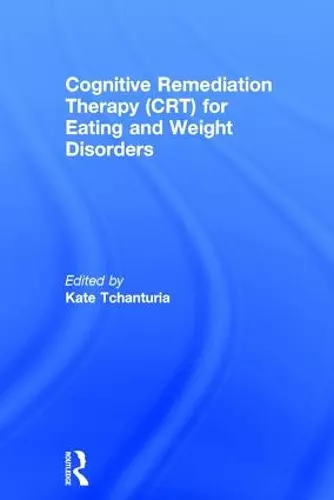Cognitive Remediation Therapy (CRT) for Eating and Weight Disorders
Format:Hardback
Publisher:Taylor & Francis Ltd
Published:31st Oct '14
Currently unavailable, and unfortunately no date known when it will be back
This hardback is available in another edition too:
- Paperback£44.99(9781138794030)

The effective treatment of anorexia nervosa (AN) remains a significant challenge. This has prompted new research into ways of engaging and keeping patients in treatment and ultimately achieving better outcomes, not only on a symptomatic level but also in broader aspects of life. In this book Kate Tchanturia brings together international experts from the field of eating disorders to discuss the effectiveness of cognitive remediation therapy for treating anorexia nervosa, and keeping patients in therapy.
Cognitive Remediation Therapy (CRT) is a type of therapy that concentrates on improving neurocognitive abilities such as attention, working memory, cognitive flexibility and planning, and executive functioning which leads to improved general functioning. Recent research has demonstrated the effectiveness of the approach for treating those with anorexia nervosa, cognitive improvements have been noted in patients, and the approach is associated with low drop-out rates from the treatment, and high levels of acceptability among both patients and therapists.
This book presents research focussing on:
- individual therapy with adults
- family-based therapy
- CRT with young people
- group format of CRT
- adapting interventions for people with co-morbidities
- clinicians experiences working with CRT
Illustrated throughout with case studies, and integrating neuropsychological testing and brain imaging this book discusses the latest research on this novel treatment approach. It will be key reading for researchers and academics in the eating disorders field wanting to trial the approach, as well as final year undergraduates and postgraduate clinical psychology students looking for a new perspective.
"Anorexia nervosa is notoriously difficult to treat. Via a decade of systematic inquiry into why our treatments often fail individuals with this disorder, Dr.Tchanturia has documented an array of cognitive insufficiencies that may reflect core traits that underlie anorexia and impair patients' ability to engage in treatments that require cognitive flexibility. Richly referenced, Tchanturia and colleagues assist the reader with identifying and assessing neurocognitive profiles in individuals with anorexia and with applying interventions that aid patients in loosening their cognitive inflexibility in service of recovery. Scholarly and accessible, this volume is a must-have for clinicians and researchers working in the field of eating disorders." - Cynthia Bulik, PhD, FAED, Director, University of North Carolina Center of Excellence for Eating Disorders"
The development of cognitive remediation therapy, which has been a landmark event in the treatment of eating disorders, has been pioneered by Dr. Tchanturia and colleagues. This approach seeks to find interventions that ameliorate traits that may constitute vulnerabilities that contribute to developing eating disorders. This excellent book now provides a state-of-the-art overview of progress in CRT. It is one stop shopping for researchers interested in the concepts underling this intervention, as well as studies assessing response to treatment, and for clinicians wanting to learn more about employing this therapy." - Walter Kaye MD, Director, University of California San Diego Eating Disorders Program
'This compilation from the cutting-edge clinical research group brought together by the highly respected Dr. Kate Tchanturia, London, UK, explores the treatment approach of Cognitive Remediation Therapy. It offers a unique opportunity to look at a highly innovative field of treatment for eating disorders.'- Professor Andreas Karwautz, Child Adolescent Psychiatrist, Vienna, Austria
"Dr Tchanturia’s pioneering work on CRT represents a novel and promising addition to the clinician’s armamentarium for the management of eating disorders and other complex mental disorders." - Professor David Mataix-Cols, PhD, Karolinska Institutet, Sweden
"Knowing how the brain’s working affects an eating disorder helps patients and their families. They can feel less stigma when they understand more of the biological basis of the condition, and can find it easier to accept the treatment they need as a result. This book brings together leading research into this important novel area." – Susan Ringwood, Chief Executive, Beat, UK
ISBN: 9781138794023
Dimensions: unknown
Weight: 521g
254 pages